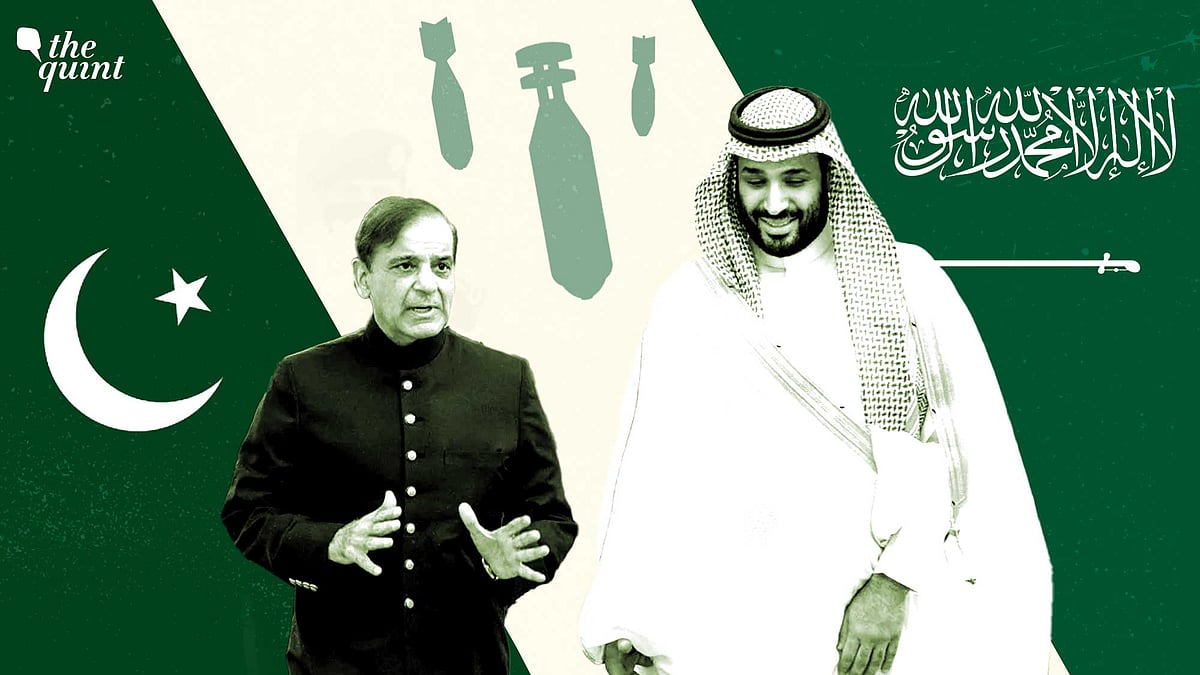
A Costly Alliance: The Perils of Pakistan’s Defence Pact with Saudi Arabia
A defence pact with Saudi may look good on paper but Pakistan cannot afford to be a rented gun for Gulf powers.

advertisement
If there is one thing Pakistan does better than conspiracy theories and cricket (though not lately), it is mistaking other people’s money for national strategy. The latest exhibit: its brand-new defence pact with Saudi Arabia, grandly announced as a promise that an attack on one shall be treated as an attack on both.
It sounds noble enough, though one suspects the Saudis are less worried about defending Pakistan and more about renting a nuclear-armed night watchman at discounted rates.
For many, the pact represents the culmination of a long, if uneven, security relationship. For others, however, the pact is a reminder of past entanglements that left Pakistan burdened rather than strengthened. A sober look at history, geopolitics, and the fine print suggests that while the agreement may offer some immediate benefits, it also risks trapping Pakistan in external quarrels, dependency and strategic vulnerabilities.
Lessons From History
Pakistan’s military ties with Saudi Arabia are not new. In the 1980s, Pakistani soldiers and officers were sprinkled across the Gulf like coriander on a biryani - in Saudi Arabia, the UAE, Jordan, and elsewhere.
General Zia-ul-Haq’s Pakistan was a regional power, actively shaping events from Tabuk to Kabul. But those years also tied Pakistan into rivalries it had little control over. The Iranian revolution of 1979 and the Soviet invasion of Afghanistan forced Pakistan into choices that brought devastating blowback: sectarian fissures deepened, jihadist militias flourished, and Pakistan’s internal security was corroded.
That era should serve as a cautionary tale. Alliances forged to serve others’ interests rarely left Pakistan stronger. The Gulf monarchies turned to Pakistan for manpower and training but were reluctant to back Pakistan on core issues like Kashmir. When Iraq invaded Kuwait in 1990, Riyadh sought two Pakistani divisions. Islamabad sent troops only under restrictive terms, and the relationship cooled.
The lesson is clear: Pakistan cannot afford to be a rented gun for Gulf powers. Strategic partnerships must serve national interest first, not nostalgia or promises of financial relief.
The Trap of Dependency
Supporters of the new pact see it as a shield against instability in a volatile Middle East. But critics warn that it risks becoming a crutch, another excuse for Pakistan to delay necessary economic reforms. Whenever Islamabad is broke (which is as predictable as sunrise), Riyadh rides to the rescue with a cheque. Loans and oil on deferred payment gave short-term relief but entrenched a culture of dependency.
True strategic strength comes not from subsidies but from investment in technology, renewable energy, infrastructure, and human capital. Without that, no external shield will protect Pakistan from internal decay.
The American Angle
An even bigger concern lies in the possibility, hinted at by former diplomat Husain Haqqani, that the pact will open the door for Pakistan to buy American weapons with Saudi financing. On the surface, this may look like a boon: modern systems without draining Pakistan’s already fragile reserves. But history shows the dangers of such entanglement.
The F-16 episode is instructive. Washington has repeatedly used Pakistan’s reliance on US aircraft to exert political pressure - withholding deliveries, blocking upgrades, and restricting operational use. In the event of conflict with India or friction with Israel, American-supplied platforms can quickly become shackles.
A more sustainable path, as some analysts argue, would be to strengthen defence cooperation with China. Unlike Washington, Beijing has proven more reliable in technology transfers and upgrades. But this requires Pakistan to ensure that Riyadh’s cheque-book diplomacy does not channel it back into Washington’s orbit.
Regional Balancing Act
There is also the small matter of Iran. Last time Pakistan leaned too heavily toward Riyadh in the Saudi-Iran rivalry, its mosques turned into battlegrounds, streets into war zones, and children into statistics. Calling this new pact a “Sunni bloc” may excite the extremists, but it will burn Pakistan faster than petrol on dry grass.
The Pakistani government will be hard pressed to frame the agreement strictly as a national security arrangement - not a religious or ideological crusade – and to reassure Tehran that deeper ties with Riyadh will not come at Iran’s expense.
Worse, the pact could drag Pakistan into conflicts far from its borders. Riyadh has a history of drawing allies into its struggles, from Yemen to Qatar. Islamabad will walk the tightrope not to wade into foreign quagmires.
Real Security Starts at Home
The Saudi–Pakistan pact is not doomed, but nor is it salvation. At best, it offers Riyadh a deterrent and Islamabad a little breathing space; at worst, it is a velvet-lined trap.
Real security will never come from Riyadh, Washington, or Beijing. It will come only when Pakistan fixes its own house - reforms its economy, governs with honesty, and treats its citizens as more than cannon fodder and tax fodder. Until then, every pact it signs will remain a shield made of paper: impressive at parades, but worthless when the bullets begin to fly.
(The author is a Fellow of the Royal Geographical Society and Explorers Club USA, and Editor of ‘Indian Mountaineer’. He is also the founder of Bharatiya Yuva Shakti, an organisation that ensures good leadership at the village level. He tweets @AkhilBakshi1. This is an opinion piece, and the views expressed above are the author’s own. The Quint neither endorses nor is responsible for the same.)
- Access to all paywalled content on site
- Ad-free experience across The Quint
- Early previews of our Special Projects
Published: undefined